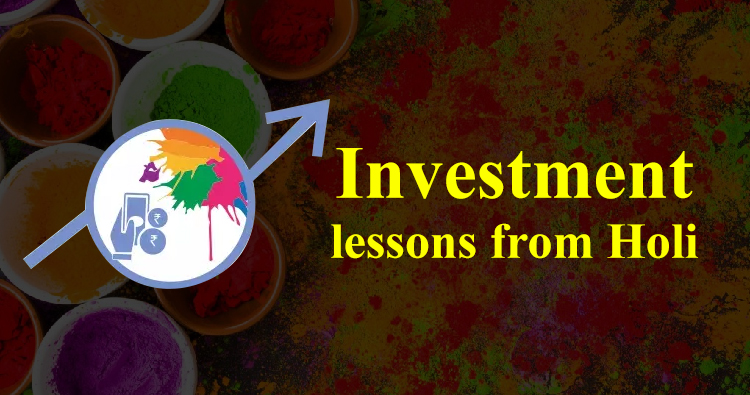Investment Lessons to Learn From Holi
Holi is a festival that we all eagerly wait for, and it is almost here. It is one of the best times of the year to meet and enjoy the day with friends and family. Holi is incomplete without colours and sweets and it celebrates the win over evil. If we compare Holi with our financial life, we see that there are many investments lessons that we can learn from Holi.
Here are some four key investment lessons that we can learn from the festival of colours.
Importance of a diversified portfolio
Holi won’t be Holi without colours. The colours make this spring festival vibrant. Similar to Holi, our investment portfolio also needs colours. The different investment assets such as equities, debt and gold are the main asset classes that colour our portfolio. It helps us to give optimised returns as it reduces the risk associated with a single asset class. Different asset classes play different roles and give different returns at the same time, which helps to minimise the risks.
So, try to maintain a diversified portfolio with different assets as per your investment objectives and risk-taking capacity.
Safety comes first
Most of us love to play with varied colours. But sometimes some colours may be harmful for our body and hair. In such circumstances, it becomes important to take safety measures.
Investment is no different. Before you invest in riskier assets like equities to achieve your financial goals, it is important to build an emergency fund to take care of unexpected expenses. An adequate emergency fund with at least three to six months of expenses can help you navigate situations such as job loss, car and house repairs among others. Liquid fund which is a type of debt mutual fund invests in low-risk debt securities is one of the best options to build an emergency fund.
Get rid of the evil
Holi signifies the triumph of good over evil. Holi gets the name from Holika Dehan where Holika was killed in a fire whereas Prahlad, a devotee of Lord Vishnu came out unscathed.
During your investment journey, you may have invested in products that do not suit you and damage your finances. Mixing insurance with investment, investing in schemes that haven’t performed in a while or investing in a high-risk product beyond your risk tolerance are some evils that you may have accumulated throughout the course of your investment journey.
Portfolio evaluation can help you figure out the laggards and evils in your portfolio and weed it out. It will help your investment portfolio to be better aligned with your financial goals.
Be Patient
Desserts such as Gujiya and Thandai are Holi staples. Gujiya is not Maggi and it requires a lot of effort, planning and most importantly, patience.
Patience is also important in the world of investments. Staying patient and disciplined over a long period of time builds wealth as time is a crucial component in the compounding process.
Focus on your financial goals and don’t let short-term movements in the market wreck your goals. If you are getting cold feet because of market volatility, talk to us to help you figure out the best course of action for you.
Portfolio diversification, being prepared for the unexpected, deleting the harmful aspects and being patient are some of the investment lessons that one can learn from Holi.
This blog is purely for educational purpose and not to be treated as a personal advice. Mutual fund investments are subject to market risks, Read all scheme related documents carefully.
www.nextportfolioindia.com










